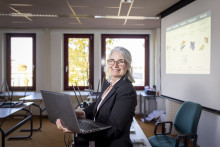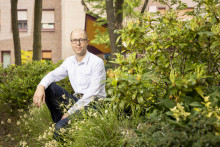How did you get into education?
‘There has always been a part of me that liked teaching. My mother has photos of me back when I was five or six, standing in front of blackboard and teaching. Professional teaching came naturally.’
Do you already know which topics you want to explore?
‘I’m currently looking into the topic of resilient education – not just through a pandemic, but also in terms of changing student dynamics and demands. I don’t think there will be a single clear model as the components will depend on the characteristics of the university, program and the student population. We will need to try different ‘resilient’ models and adjust them accordingly.’
What have we learnt about education thanks to the pandemic?
‘The pandemic has revealed how adaptable and resilient education is thanks to technologies that are available today and the infrastructures in place at our university. Although the pandemic showed how adaptable students and staff are there is plenty still to be done. In July we ran a survey to better understand what worked well and what didn’t so that we can think about what improvements are needed. One thing that really stood out was how motivated staff were to continue to provide quality learning environments for students. Everybody wanted to make it work and experimented with different forms of communication and education learning activities. So back to your question, what we did learn was that we can move many aspects of education to an online environment but that things like interactions were a little more difficult. Now is a good time to reassess our education.’
What are main challenges and advantages of online education?
‘At first, I think people felt online education wasn’t as good as face to face education. Now I think they see that it is as good. Of course you lose some pieces when you move things online, but we just need to find the right balance. Online education also has advantages. It has far greater reach. As long as people have internet, they can join from anywhere. You can reach areas that would otherwise be completely inaccessible.’
Do you think online education is the future of education?
‘I think online education will be a part of education, but how it is incorporated and how much will depend on the program and student population. There are clearly benefits to both: face to face and online. It depends on the age group. For undergraduates, who have just left home for the first time, fully online education may not be as suitable. They are not just learning about the topic, they are also learning about themselves. For older students and professionals, online education can be a great solution. Especially if you are a working professional with a family and unable to move to the university, this gives you the opportunity to continue working on your development.’
How do you know that you are doing a good job as a teacher?
‘As a teacher, you never stop analyzing what you are doing right or wrong. But you also need to accept that not everyone will be passionate about the topic. You just need to make an impact on one person. That is already a great accomplishment. I just got an email from my former student saying that she got a new job and that she still uses everything I taught her. Things like that show you that you are making an impact.’
Focus on education
The position of professor with a focus on education is intended for scientists with excellent performance in both research and education. Justine Blanford is the first to be appointed to this role at the UT. She is an expert on Geographic Information Systems (GIS) and spatial data. Before joining the department of Earth Observation Science at the ITC Faculty in April, she worked as an associate teaching professor at Penn State University in the USA.









